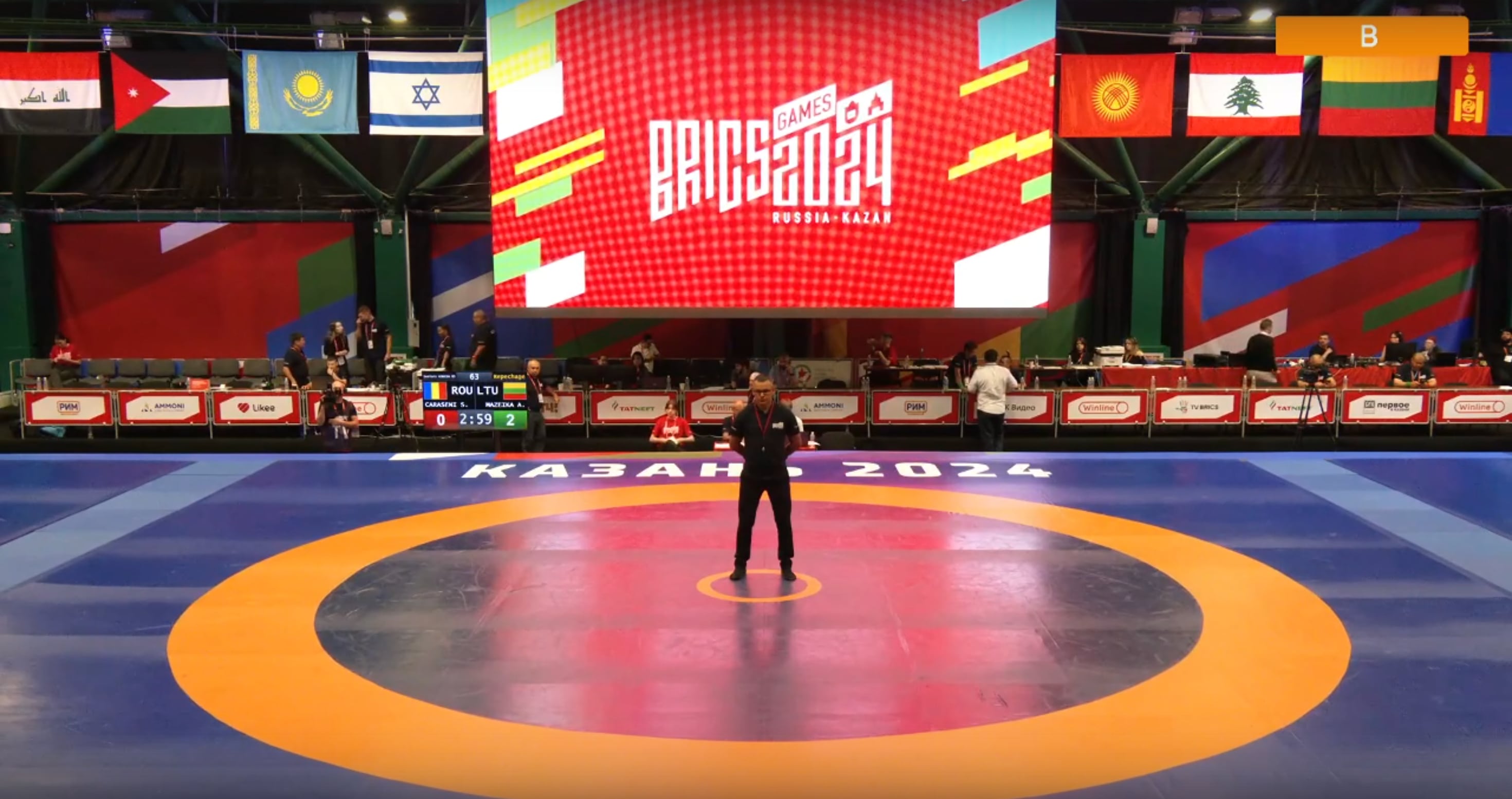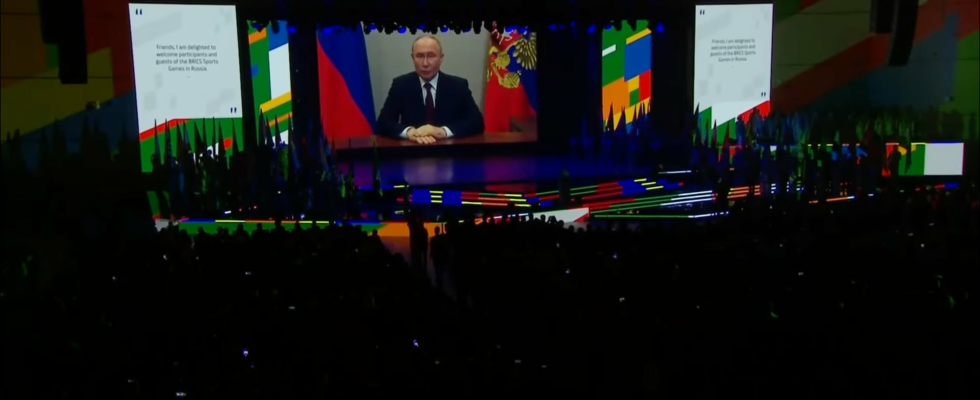Have you heard of the “BRICS Games”? This sports competition, organized each year by the country holding the presidency of the group of emerging countries (initially Brazil, Russia, India and China, which were joined by South Africa, and more recently by Egypt, the United Arab Emirates, Ethiopia and Iran) was held in June in Russia. But this time, the event stood out from previous editions in its ambitions. Any resemblance to the Paris Olympics, from which Russia was banned as a nation, was perhaps not purely coincidental.
The tone was set right from the opening ceremony, held on June 12 in the large concert hall of the Kazan Expo, a gleaming complex located in the sports capital of Russia. On the screen, the names of those whom the country counts among its greatest national prides parade to the rhythm of a testosterone-fueled voice: Igor Kurchatov, father of the Soviet atomic bomb, Yuri Gagarin, the first man to fly into space, and Svetlana Savitskaya, the first woman to perform an extravehicular activity in space. The flag bearers enter the stage in alphabetical order: Afghanistan, Algeria, Argentina, and China, via France, Italy and Germany. Because this year, Russia has seen big by opening the Games to non-BRICS countries. In total, no fewer than 82 nations are announced to thunderous applause. Suddenly, Vladimir Putin appears on the screen: “For two weeks, the competitions will bring together more than 3,000 athletes from nearly 100 states. I am convinced that this large-scale sports festival will demonstrate the triumph of universal values of sport, equal opportunities and an honest and uncompromising struggle.”
“To disrupt the Olympics”
However, the Kremlin has sworn that it was not a question of competing, a month in advance, with Paris 2024. Last September, the Russian Minister of Foreign Affairs, Sergei Lavrov, quoted by the Russian press agency (TASS, financed by the Kremlin), did not budge: the event would be intended to “complement” the Olympic Games and not to compete with them, emphasizing in passing that they would be open to all athletes, “in full compliance with the principles of the Olympic Charter”. The message was addressed to the International Olympic Committee (IOC), which has only authorized a handful of Russian and Belarusian athletes to compete in Paris under a neutral banner. “With this event, the Kremlin obviously wanted to interfere with the Paris Olympics, to put spokes in the wheels of the IOC, deciphers Jean-Baptiste Guégan, expert in the geopolitics of sport, professor at Sciences Po Paris and co-author with Lukas Aubin of The War of Sport, a new geopolitics (Tallandier). In reality, the BRICS Games are feeding a broader ambition, namely to challenge the order established since the Second World War, with an IOC that is omnipotent in terms of international sports competitions, by showing a Russia that is the leader and unifier of the BRICS, capable of cracking and competing with the West and its institutions.”
What remains of these Games, a month later? According to several media outlets from BRICS member countries, statements by Vladimir Putin’s lieutenants or the official website of the competition, the event was a sell-out. On the website of the TASS news agency, we find the wonderful story of a Brazilian diver declaring that he “dreamed of performing in Kazan”, or that of a Venezuelan jumper “happy to have the opportunity to compete with the Russians”. For his part, Vladimir Leonov, Minister of Sports of the Republic of Tatarstan, maintains the fable of an audience glued to their television sets (“more than 19 million spectators” and “more than 22 million” on the Internet) and of conquered athletes, to the point that most would have compared these Games “with the Olympic Games”. Unsurprisingly, Russia outrageously dominated the medal rankings (509), followed by Belarus (247), another banned from the Paris Olympics. Far behind are China, Uzbekistan and Brazil.
“Like non-alcoholic beer”
But the reality is miles away from the official propaganda. Of the total number of athletes announced (3,000, according to the Kremlin), Russia alone has 648, and Belarus 430. That is a third of the total number of participants. And that is without counting the athletes sent by certain regions occupied by Russia, such as Abkhazia and South Ossetia in Georgia. As for the other BRICS member countries, no top-ranking athletes made the trip. Even the Chinese ally was content to send 136 athletes. “Participating in these Games is taking a risk. Even within the BRICS, top athletes do not want to be contaminated by Russia’s reputation, both in terms of the war in Ukraine and in terms of doping. In addition, the level is clearly lower than at the Olympics, so what is the point of risking injury two weeks before the Paris Games? Not to mention the pressure from the IOC, which no athlete would want to alienate,” explains Lukas Aubin, research director and head of the sport and geopolitics program at Iris. In November 2023, Thomas Bach, IOC President, had indeed declared that “none of us should participate in any way whatsoever in such supposedly sporting events with political aims.” “It is also an admission of failure for the concept of the “Global South”, adds Jean-Baptiste Guégan. Not all the BRICS countries have the same interests in all respects. China, for example, knows perfectly well that it would lose out by depriving itself of the Olympic Games”.
Even within the Russian team, the picture is far from idyllic. On the showcase side, we find some athletes leading athletes including former 110-meter hurdles world champion Sergei Shubenkov (in 2015), and gymnast Nikita Nagornyi, Olympic gymnastics team champion in Tokyo, but under American sanctions due to his support for the war in Ukraine, and absent from the Paris Games. For his part, Aleksandr Grychtchouk, Russian chess grandmaster, said that these Games “are like non-alcoholic beer. It’s better than nothing. But, to be honest, it doesn’t replace the Olympic Games”. Similarly, sprinter Kristina Makarenko considered it “completely absurd” to compare the BRICS Games with the Olympic Games. “The emotions at the BRICS Games? None”. While the organizers announced 108,000 spectators on site, the videos show almost empty stands. “I’m discovering that it exists…”, replied one of our Russian interlocutors. Another: “I’ve hardly heard of it, only seen a few advertisements on the streets.”
Ghost Athletes
How then can we explain the presence of athletes from other countries, starting with Europe? L’Express reviewed several competitions (the recording is available on the official website for each discipline). In belt wrestling (“koresh”), for example, several of the victories announced on the Games platform actually correspond to forfeits (one of the two athletes did not show up). Also in this discipline, the Lithuanian athlete Andrius Mazeika is said to have won two to zero against the Romanian Stepan Caraseni. But the video of the “fight” shows something else: in the center of the track, a referee with his arms crossed behind his back, motionless. The one-on-one lasts for long seconds when suddenly, the score displayed on the screen, 0 to 0, changes to 2 for the Lithuanian. Neither athlete showed up.

Some athletes from non-BRICS countries did indeed take part in the event. But they often have ties to Russia. For example, Sofia Kalinicheva, an acrobatic rock’n’roll dancer for the German team, who in 2021 appeared as a member of the “Russian Federation” at the Rock’n’Roll World Cup in Ljubljana (Slovenia). Similarly, according to her social networks, Sophia Parisic, a gymnast for the French team, is a student at the Charles de Gaulle high school in Moscow.
And then there are those who have been more discreet about their participation. L’Express contacted several federations in different European countries, whose athletes were said to have been present at the Kazan Games. Only one of them responded, explaining that they had not sent “any athletes to the BRICS Games”, and adding that if the athlete in question had gone, it was not “on official representation”. After checking, he did indeed go to Tatarstan, but did not respond to our requests.
Gold medal without competitors
The apotheosis of these Potemkin Games took place on June 14. On the podium, in first place, Aleksandr Maltsev, synchronized swimmer of the Russian team, stands stiffly, in a military manner. The Russian national anthem sounds. The audience stands. But to his left and right, no one. The man has just received the gold medal in his category, for lack of competition… And he is not the only one. Three days later, on June 17, it is the turn of Irina Timoshinina and Rudolf Ternovoi, in the synchronized diving category, to win first place alone on the podium.
“With these Games, Russia was targeting three people: the Russians, the BRICS member countries, and the West. We can say that Putin missed his target three times,” sums up Lukas Aubin. On June 7, the “Friendship Games”, which were to take place in Russia in September, were postponed. The event was intended as a nod to the eponymous competition created in 1984 by the USSR, in response to the boycott of the Los Angeles Olympics. It was in line with this great Russian sports year, which had already begun in February, in Kazan, with the organization with great fanfare of the “Future Games”, a mix of virtual and traditional sports. Another failure.
